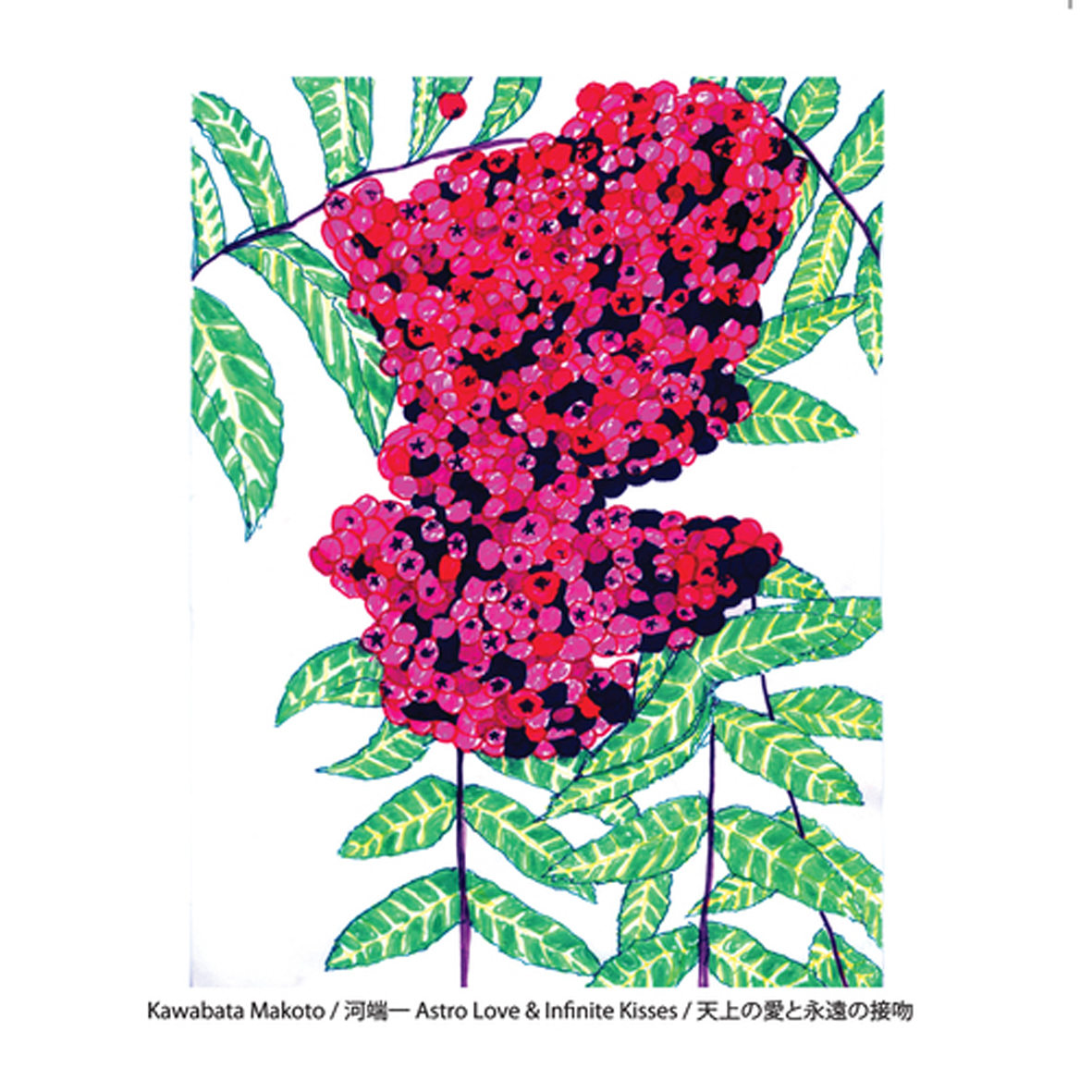Kawabata Makoto, "Astro Love & Infinite Kisses"
 I have admittedly become quite numbed to the power of Acid Mothers Temple in recent years, but that has certainly not stopped me from appreciating the unique talents of Kawabata Makoto.  If anything, I am weary of Makoto's primary outlet because their high-volume maximalism hides or precludes so many appealing facets and nuances of his artistry.  Thankfully, his solo albums–especially the ones on VHF–do no such thing and allow his exotic and eccentric vision to unhurriedly blossom without distraction (most of the time, anyway).  On this latest opus, Makoto adeptly blends echo-heavy Krautrock guitar, traditional Indian music, and his own distinctively lysergic tendencies to weave a sprawling fantasia of warped and trance-inducing drones.
I have admittedly become quite numbed to the power of Acid Mothers Temple in recent years, but that has certainly not stopped me from appreciating the unique talents of Kawabata Makoto.  If anything, I am weary of Makoto's primary outlet because their high-volume maximalism hides or precludes so many appealing facets and nuances of his artistry.  Thankfully, his solo albums–especially the ones on VHF–do no such thing and allow his exotic and eccentric vision to unhurriedly blossom without distraction (most of the time, anyway).  On this latest opus, Makoto adeptly blends echo-heavy Krautrock guitar, traditional Indian music, and his own distinctively lysergic tendencies to weave a sprawling fantasia of warped and trance-inducing drones.
Kawabata Makoto is clearly not one to shy away from throwing down the gauntlet, as he opens Astro Love & Infinite Kisses with quite a quixotic tour de force: "Dos Nurages" is basically an entire album by itself, stretching out for over 40 minutes and consuming both sides of an LP.  My initial impression was that it sounded like a crazily stretched-out Mark McGuire song filtered through a nightmare.  That is not quite fair to Makoto though, as Mark McGuire did not invent this style of guitar playing–he just happens to be very prominently obsessed with it.  More likely, Makoto just fired up his echoplex one day and decided to channel his inner Manuel Göttsching, then decided that it needed some kind of additional twist to make it worth releasing.  In essence, "Dos Nurages" is an endlessly shifting and rippling trance of clean guitar that seems far more focused on creating a restless sense of motion than on building into any sort of distinct melody or structure.  That is merely the foundation, however: the twist is that Makoto embellishes his gently roiling ripple-fest with a distant-sounding and infernal host of sliding and dissonant synth flourishes.  That makes for an intriguing collision of disparate themes, but it is not quite intriguing enough to sustain my interest for 40 minutes, as it exasperatingly never develops into anything more.  It is a lot like watching a master juggler that is monomaniacally fixated on repeating on the same trick into infinity.
Thankfully, the second LP is far more to my liking, though Makoto still seems quite content to stretch out and luxuriate in a single idea for the entire duration of an epic song.  The important difference is that the ideas get considerably better as the album progresses.  On the nearly 18-minute title piece, for example, Makoto unfurls an elegiac and temporally dislocated arpeggio progression that evokes some kind of melancholy ancient procession, a stylistic niche that Natural Snow Buildings fans will no doubt recognize.  Despite a similarly "funeral march" approach to percussion and some similarly corroded and wrong- sounding strings, Makoto's variation on that theme takes an ingenious and distinctive turn, as the piece is gradually consumed by a massive, engulfing roar that seems to be developing completely independently.  It feels like the fabric of reality is being pulled apart to reveal enigmatic flickers of yet another reality.  That is quite a neat (and absolutely apocalyptic) trick.
The closing "Woman from Dream Island" is considerably less world-ending in scope, but compensates by again being appealingly hallucinatory and trance-inducing.  As is his wont, Makoto again decides to more or less flog just one theme for the entire song, but the buzzing tamboura, backwards guitars, and descending melody are rich enough to remain fairly compelling without much development.  With a little but more work, "Dream Island" probably could have been crafted into a perfect and endlessly hypnotic infinite loop.  Instead, it ends up overstaying its welcome slightly before Makoto unexpectedly shifts gears to close the piece with a gently pastoral acoustic guitar outro.  It does not seem to belong with the rest of the song at all, but it makes for a perversely appropriate ending for an album where unpredictable tonal shifts, perplexing pacing, and bizarre song structures are basically the norm.  Kawabata Makoto is quite an inscrutable artist and Astro Love & Infinite Kisses is quite an inscrutable album.  On one hand, it is dogged with overlong songs, an over-reliance on improv, and a disorienting tendency to pastiche Makoto’s many disparate influences.  On the other, "Astro Love & Infinite Kisses" is an absolutely revelatory and stunning piece of music.  The catch with Makoto is that the two sides are hopelessly intertwined.  It seems quite unlikely that he will ever make an entire album that I hail as uniformly brilliant or wildly original, but it is certainly very interesting to see all of the unexpected places that his muse takes him each time he tries.
 



